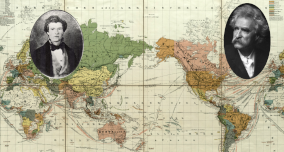While Sam had been away in San Francisco [May to July of 1863], the impresario Tom Maguire, a former cab driver and gambler, had built a sixteen-hundred-seat theater on D Street near Union in Virginia City patterned after his opulent opera house in San Francisco, and it was routinely crowded with folks eager to see such popular local favorites as Lotta Crabtree, Julia Dean Hayne, and Frank Mayo. Maguire reserved the front row, the ‘printers’ pew,” for reporters, and Mayo was so friendly with the staff of the Enterprise that he later claimed he based “all that is quaint and humorous” in his leading role in Frank H. Murdoch’s frontier melodrama Davy Crockett (1873) on Sam and “all that is sweet, wholesome, and lovable” in the role on Joe Goodman.
The Life of Mark Twain: The Early Years, 1835-1871 page 199
When Maguire's Opera House first opened, in July 1863, Maguire and his representatives sought to cement good relations with the leading Virginia City newspaper, the Enterprise. Joseph Goodman, its editor, was awarded poster and program printing, generous advertising, and a permanently reserved row of seats in the Opera House for the exclusive use of his staff. All was merry, and the quips of the reporters only added to public interest in the fine new theatre. Often the three carefree reporters attended a show en bloc, competing for the honor of reviewing it, or selecting the high points of each man's criticism for one splendid comprehensive article.
When Adah Isaacs Menken was announced at the local Opera House, in March of 1864, Virginia City was eager and boisterous in its desire to view the “naked lady” who had enjoyed such wide publicity and comment in San Francisco. But Goodman, Dan de Quille, and Mark Twain turned capricious: they decided that The Menken was fair game for their best humor, and were determined to take her down several pegs.
Then The Menken appeared at the Opera House and completely captivated her avowed persecutors. Joseph Goodman, as superior in command, preempted the happy task of rhapsodizing over her charms, and the review of her opening performance rang with effusive praise.
Instead of pleasing the Opera House players, this procedure seems to have aroused a certain resentment, which might have sprung from suspicion of a deep irony or even from jealousy. For, after the fashion of the times, the actors took it upon themselves to refer rather familiarly to Goodman and his enthusiastic review in ad lib “gags”—the bane and the delight of the theatre in that day. Angered in turn, the Enterprise reporters demanded a public apology from Charles Graves, Maguire’s manager. The Menken, too, was incensed and, upon Graves’ refusal to comply, she disappointed a huge audience by declining to play with the supporting troupe. The next night, relenting, she is said to have been rewarded by an effusive paean from the pen of Mark Twain. Her engagement ran on, triumphantly, but at its close Graves resorted to punitive measures in an attempt to get the Enterprise in hand—withdrew from that newspaper all printing, advertising, and complimentary theatre tickets.
A feud developed; the Enterprise reporters ignored all activities at the Opera House, except when an opportunity for ridicule seemed to open. The occasional reviews of productions which the critics deigned to attend (and pay to see) were caustic to the point of cruelty, and Virginia City appearances were soon anticipated with fear and trembling by Maguire’s actors. Such stars as Fanny Brown, George Pauncefort, Walter Montgomery, and Emily Thorne turned tail before the storm of abuse dealt them by the Enterprise, and finally the theatre had to be closed. Eventually Graves was transferred by Maguire to less troubled waters and the required apology to the newspaper was forthcoming, But Maguire and the Opera House had suffered financially and in dignity.
For many weeks the house was almost continuously dark. Finally Maguire relinquished it to Max Walter, whose local Music Hall had been destroyed by fire in September 1866. In the early spring of 1867 Maguire sold the fine Virginia City theatre to John Piper for a sum reported “not exceeding $2,500, and this, we believe, to satisfy attachments and mortgages.”"
The disaster may have been hastened by other factors in addition to the caprice of the Enterprise staff; but the sequence has a dramatic character not more amazing than others in the “Napoleon’s” career.
